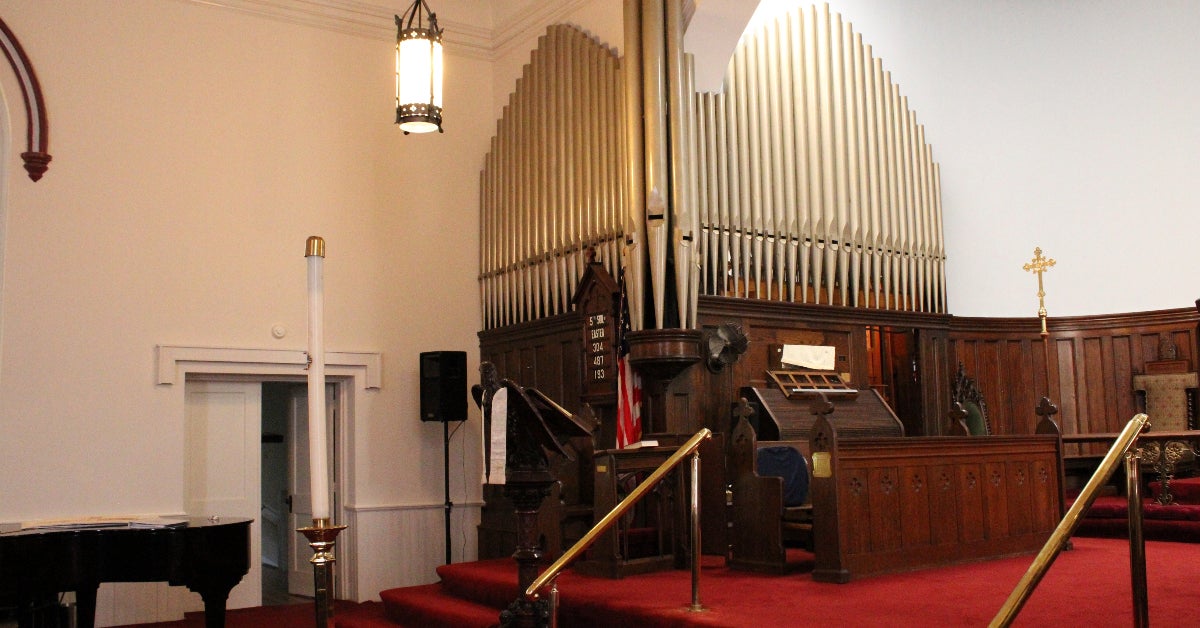Christ Episcopal congregation to rededicate organ with concert, prayer
Published 4:00 am Sunday, October 15, 2023

- Christ Episcopal Church's organ was installed in 1922 in a small room of the church's chancel in the front of the church, following a new custom at the time of moving the organ and choir to the front of the church. (Photo by John Surratt | The Vicksburg Post)
The congregation of Christ Episcopal Church will observe the 101st anniversary of the church’s organ on Oct. 22 with a 4 p.m. concert and reception.
The Rev. Sam Godfrey, Christ Episcopal’s rector, said Sheila Hess, organist for Northminster Baptist Church in Jackson, will perform music for organ and organ and flute and congregational hymns for the audience to sing, “and in the process, we will also rededicate the organ; there are prayers in one of our books for the occasion.”
He said Christ Episcopal’s organist, Marie Cunningham, will accompany Hess on the flute during some selections.
Built by the M.P. Moller Organ Factory and designated “Pipe Organ No. 3474,” on its invoice, Christ Episcopal Church’s organ has been an integral part of the church’s history. The music that flows from the pipes covering two walls in the front of the church has welcomed the congregation and accompanied the church choir since it was installed a century ago in 1922.
“(Moller) built lots of organs, and they were all over the county at that particular time,” said Madison Lindsey of Pipe Organ Specialties in Laurel, which repairs and maintains the organ.
And when Christ Episcopal’s organ was installed, it caused a change in church custom that remains today.
“The first organ and the choir were in the rear of the church — that was the older style; the colonial style,” former church historian George Downing said in a 2022 interview about the organ. “When the congregation of the church decided to move the organ and choir in front in the chancel, that was a change in style that had become popular.”
He said the organ was installed in a small room in the chancel, which he said was not originally designed to take an organ.
“It was built for the ministers to vest in (put on vestments),” Downing said. “It was a small room. As a child it was kind of a scary place; it was dark and it had pipes going up so it was a different sort of place.
“One of the jobs of the boys of the church was to assist the rector,” he added. “There was a passageway; you could leave the chancel through the passageway for errands if needed. That was also the way the rector could leave the chancel without going down into the congregation.”
According to its invoice, the church ordered the organ on Aug. 19, 1922, and Lindsey said the crate the organ was shipped in was used for the swell box, which was a unique feature at the time. The swell panel in the organ’s interior bears the organ’s number and the name of the church’s rector at the time, the Rev. Charles Woodson, who was rector from 1914 to 1946.
Lindsey said the swell division is all the pipes that are played on the organ’s upper keyboard.
“They put it in kind of a box with shutters in order to control the volume,” he said. “The pipes always play at the same volume so the only way to control the volume is to put them inside an enclosure and close it up.”
The organ, he said, “Is pretty much original; there’s been a couple of small additions done over the years but what you see is the way it was when they put it together.”
He said the organ’s electric motor has been replaced, adding the motor develops the air pressure for the organ and also at one time had a generator.
“On one end it had a shaft for the blower and on the other end it had a shaft for the generator because the organs ran on DC current (direct electric current) and they had 12-14 volts DC, so they had a small generator that made the DC run the organ,” Lindsey said. “Now, we use a modern power supply. Back then, they didn’t have those power supplies so they used a generator.”
The organ, he said has several voices or sounds, and there are four basic sound families in a pipe organ.
“There are principals, which are unique to the organ and basically what you hear when a hymn is being played,” he said. There are also “families” of sounds that can mimic orchestral instruments like strings, woodwinds, trumpets and other instruments.
All the sounds from the four basic groups are represented in the organ at Christ Episcopal, Lindsey said, “But it has multiple sounds, not just one of each.”
The organ uses metal and wooden pipes to produce its sounds and has three reservoirs, which Lindsey called a “wind regulator” to control the air pressure from the blower to allow the organ to operate properly.
The concert, Godfrey said, is free and open to the public. “We are not taking a collection, but donations for the organ will be accepted.”






